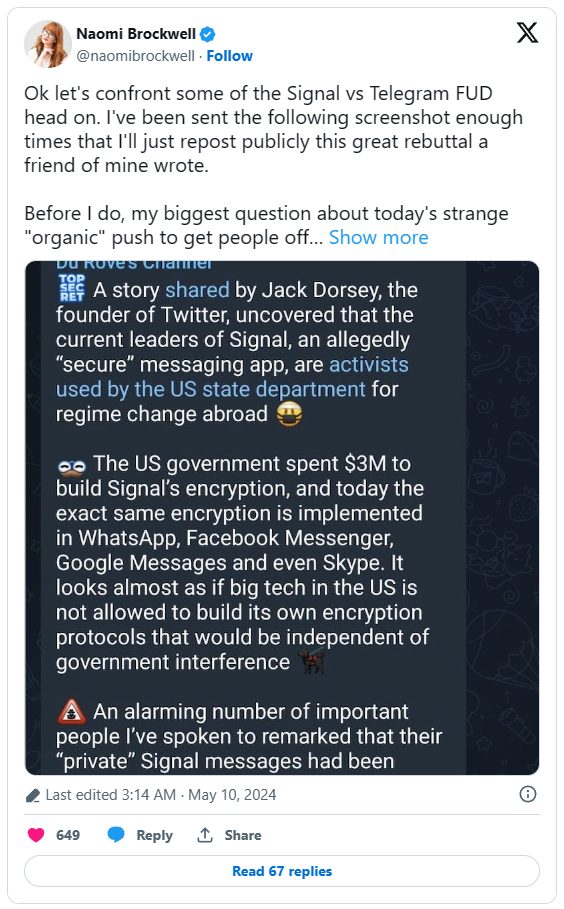Data privacy has become paramount, so the debate over which messaging app offers superior security is ever-present. Recently, the spotlight has turned to Signal and Telegram, two prominent players in the field of encrypted communications. Naomi Brockwell, a tech journalist and privacy advocate, addresses this ongoing dispute with a keen analysis, particularly focusing on the misinformation and fear, uncertainty, and doubt (FUD) being spread about some of these platforms.
The Misleading Push Against Signal
Brockwell points out a peculiar trend where there’s a push to shift users from Signal to Telegram. She questions the logic behind this move, especially since Telegram lacks certain privacy features that Signal upholds, such as private group chats and desktop availability for private DMs. Brockwell suggests that if privacy is truly the concern, recommending Telegram, which does not encrypt group chats or provide end-to-end encryption (E2EE) by default, seems contradictory.
She also criticizes Telegram’s approach to privacy, highlighting that its CEO, Pavel Durov, often deflects critical privacy questions, potentially misleading users by conflating E2EE with mere encryption in transit. This conflation could lead users to believe their communications are more secure on Telegram than they actually are. Brockwell warns users to stay vigilant as these red flags suggest that Telegram’s privacy guarantees might not be as robust as they claim.
Signal’s Robust Privacy Framework
In contrast, Signal’s commitment to privacy is evident through its consistent advocacy against encryption backdoors and its proactive engagement with policymakers. Despite criticisms about Signal’s US government funding, Brockwell argues that government support does not necessarily compromise the app’s security. She draws parallels to other privacy-focused tools like Tor, which also received US funding and are celebrated for their robustness and reliability.
Brockwell also tackles the criticism regarding Signal’s encryption being used in other messaging services. She argues that Signal’s protocol is widely adopted not because of any sinister reasons but because it is time-tested and considered the gold standard in encryption technology. The fact that other major services implement Signal’s encryption underscores its reliability and effectiveness.
Why Does Encryption Matter?
The loss of online privacy, particularly in terms of encrypted communications, can have profound financial implications for corporations. This aspect of cybersecurity is critical not only in protecting sensitive corporate information but also in maintaining trust with customers and partners. Here’s how the erosion of encrypted communications could affect corporations financially:
1. Increased Risk of Data Breaches
Without robust encryption, communications can become vulnerable to interception by unauthorized parties. Data breaches can expose sensitive information such as financial records, intellectual property, employee data, and customer details. The costs associated with data breaches are significant and include:
- Remediation costs: Expenses related to investigating the breach, securing the breached systems, and implementing measures to prevent future incidents.
- Legal fees and fines: Costs arising from litigation by affected parties and penalties imposed by regulatory bodies for failing to protect data.
- Compensation payments: Payments to affected customers for credit monitoring services and compensation for any losses they might incur.
2. Loss of Intellectual Property
Corporate espionage can become easier when communications are not secured through encryption. Losing trade secrets, innovative ideas, and unique business strategies to competitors can severely impact a company’s competitive edge and market position, potentially leading to significant financial losses.
3. Damage to Reputation and Customer Trust
Trust is a critical asset in the business world. A loss of privacy implies a company cannot safeguard customer or partner information, which can damage its reputation. The resultant loss in customer confidence can lead to:
- Customer attrition: Customers might choose to move to competitors if they feel their privacy is better protected elsewhere.
- Difficulty in acquiring new customers: A tarnished reputation can make it harder to attract new business, affecting revenue growth.
4. Operational Disruptions
When sensitive communications are intercepted, it can lead to operational disruptions. For example, if strategic decisions or proprietary methodologies are leaked, it may force companies to alter their operations or strategies abruptly, which can incur costs due to the need for quick adjustments or even operational halts.
5. Increased Costs for Additional Security Measures
In the aftermath of a privacy breach, corporations may need to invest heavily in enhanced security measures to restore the integrity of their communication channels and regain public trust. These measures include:
- Advanced encryption technologies: Implementing stronger encryption protocols across all communication channels.
- Employee training: Regular training sessions for employees on the importance of secure communications and best practices in maintaining privacy.
Community Reaction
In the online dialogue between “smol compute” and Naomi Brockwell, concerns are raised regarding the ideological leanings and potential affiliations of Signal’s leadership. “smol compute” expresses skepticism about the choices made by Signal in selecting its leadership, suggesting that these decisions could have broader implications for the platform’s commitment to the First Amendment and overall transparency.
Naomi Brockwell agrees with the concerns raised, indicating that the selection of certain individuals on Signal’s board might be inappropriate given their backgrounds and potential biases.
“Secrets of Privacy” emphasizes the necessity of continuous scrutiny regarding Signal’s leadership choices, pointing out that concerns about these choices are valid and should persist. However, they caution against a wholesale switch to Telegram, recognizing that while Telegram may not offer the privacy assurances some assume, it doesn’t invalidate the concerns about Signal.
Raphael Spannocchi raises an intriguing question about the alignment of Signal’s board members with fundamental constitutional rights, reflecting a deeper anxiety about potential ideological biases influencing the platform’s operation. His query about the whereabouts of a recent audit highlights the community’s demand for ongoing transparency and accountability from privacy-focused services.
Reichard Könige and “quest4facts” propose alternative platforms like Session, Simplex, and Matrix (Element), suggesting that users have several other privacy-focused messaging options if Signal’s approach raises concerns.
Prioritizing Privacy and Security
As the debate rages on, Brockwell’s analysis provides a nuanced perspective, encouraging users to look beyond superficial claims and understand the technicalities of what each platform offers in terms of privacy and security. For those truly concerned about safeguarding their communications, understanding the underlying technologies, policies, and practices of these messaging apps is crucial.
Brockwell’s commentary not only clarifies the landscape of encrypted messaging apps but also serves as a reminder of the importance of informed privacy choices.
Author Profile

- Ex-community moderator of the Banano memecoin. I have since been involved with numerous cryptocurrencies, NFT projects and DeFi organizations. I write about crypto mainly.
Latest entries
- June 6, 2025NewsWireElon Musk to Decommission SpaceX Dragon after Trump Threat
- December 9, 2024Stock MarketMaster the Time Value of Money Financial Concept
- November 18, 2024Stock MarketFinancial Ratios Guide to Measuring Business Performance
- November 11, 2024NewsWireLabour’s UK Budget: A Fiscal Smirk of Contempt for Working People





